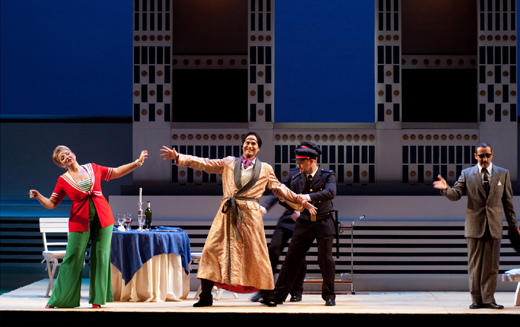 Spain J. Strauss, Die Fledermaus: Soloists, Orquesta Sinfónica del Principado de Asturias, Coro de la Ópera de Oviedo, Eric Hull (conductor), Teatro Campoamor de Oviedo. 18.09.2011 (JMI)
Spain J. Strauss, Die Fledermaus: Soloists, Orquesta Sinfónica del Principado de Asturias, Coro de la Ópera de Oviedo, Eric Hull (conductor), Teatro Campoamor de Oviedo. 18.09.2011 (JMI)
Production: Ópera Las Palmas de Gran Canaria
Director: Mario Pontiggia
Sets and Costumes: Mario Pontiggia
Lighting: Eduardo Bravo
Cast
Eisenstein: Gabriel Bermúdez
Rosalinde: Mariola Cantarero
Adele: Chen Reiss
P.Orlofsky: Jossie Pérez
Doktor Falke: Peter Edelmann
Alfred: Albert Casals
Frank: Enric Martínez-Castignani
Doktor Blind: Francisco Vas
Ida: Rocío Martínez

The Oviedo Opera opens the 2011/12 season with Johann Strauss’ operetta Die Fledermaus. That’s quite a change from the initially intended opening Strauss, namely Richard’s Der Rosenkavalier—a consequence of economic considerations, apparently. The result was hit and miss: remarkable stage work combined with a very poor musical interpretation and non-too exciting cast, partly recycled from the planned Rosenkavalier.
Director Mario Pontiggia premiered this production in April 2007 at Las Palmas where he is the Artistic Director. Pontiggia sensibly keeps the German for the parts that are sung but transposes the dialogues—just as sensibly, for this humorous operetta—into Spanish with some added Asturian touches. The stage is colorful and effective, with a central module in acts I and III, leaving a large open space at Prince Orlofsky’s party during act II. The chorus and extras effectively move about the charming sets during said party. Less interesting is the artificiality of most singers’ interpretations. Then again, it’s probably as difficult for them to act in Strauss’ Echt-Viennese trifle as it would be for Austrians to authentically nail a zarazuela. What we got was the usual excess of histrionics, excessive even for this occasionally campy story. The action is brought up to the 1950s (à la Oh… Rosalinda!!)… just not very successfully.
Canadian Eric Hull conducted the performance, as he did at its Las Palmas premiere. The Asturias Orchestra has never been an outstanding ensemble, but until very recently it was at least very decent, perfectly comparable with those playing regularly in Bilbao. On this day it was unrecognizably bad. From the overture to last note, the sound coming from the pit never gelled. Heavy handed, joyless, and zapped of energy, Mr. Hull didn’t do orchestra, audience, and most of all Johann Strauss any favors. At least the chorus performed ably, largely thanks to the work of its director Patxi Azpiri who has greatly helped shaping that ensemble over the last two years.
The cast, too, failed to deliver anything of note. Gabriel Bermúdez as Eisenstein had a too small voice and projected it badly, to boot. Mariola Cantarero sang Rosalinde, but her voice responds more to the vocal characteristics of Adele – the role she played in Las Palmas. She was good, but short of glamour and with an uncontrolled top register at the end of her Csardas. Chen Reiss was no more than a soubrette in the part of Adele; Jossie Perez as Prince Orlofsky was rather weak, apart from offering an ungainly voice. Peter Edelmann’s Doktor Falke was a routine, Francisco Vas a solid Dr. Blind. Enric Martinez-Castignani—Frank—was a better actor than singer and Albert Casals and interesting Alfred whom I would like to hear in a more important role. Rocio Martinez, though small-voiced, made for an attractive Ida.
At the party-scene with its inserted show-time pieces Prince Orlofsky’s ‘guests’ were two singers from Asturias: soprano Ana Nebot, who sang a good Manon’s Gavotte, and tenor Alejandro Roy, who showed excellent material and poor musicality in “Recondita Armonia”.
José Mª Irurzun